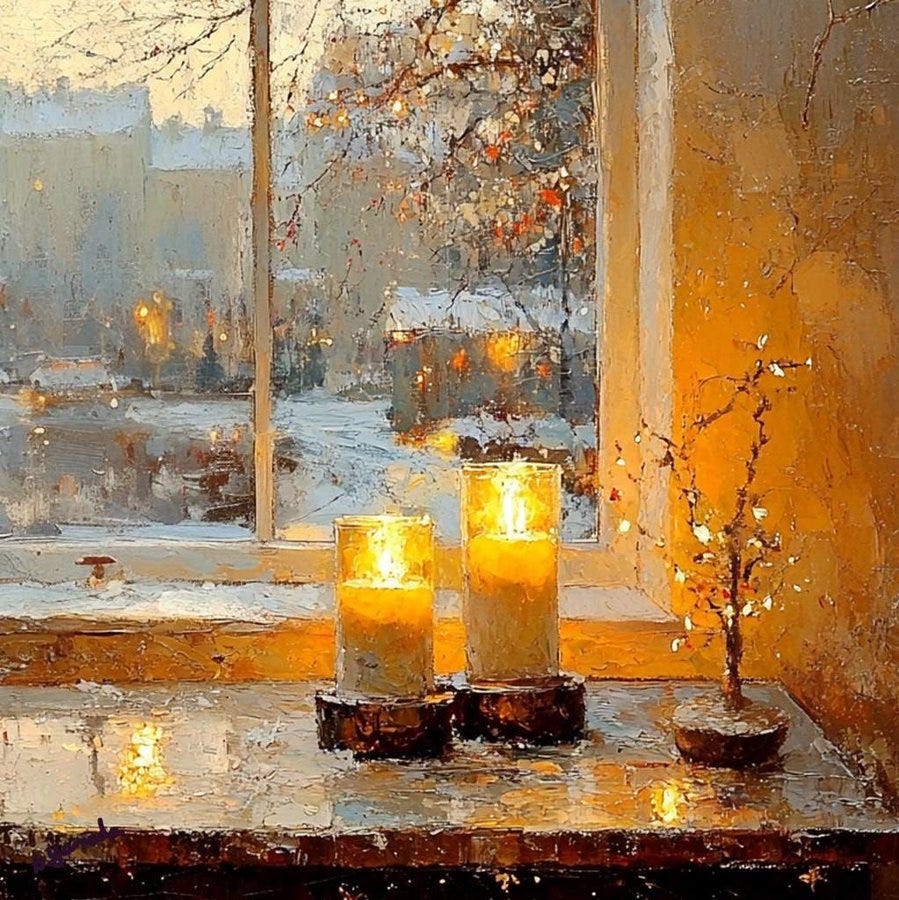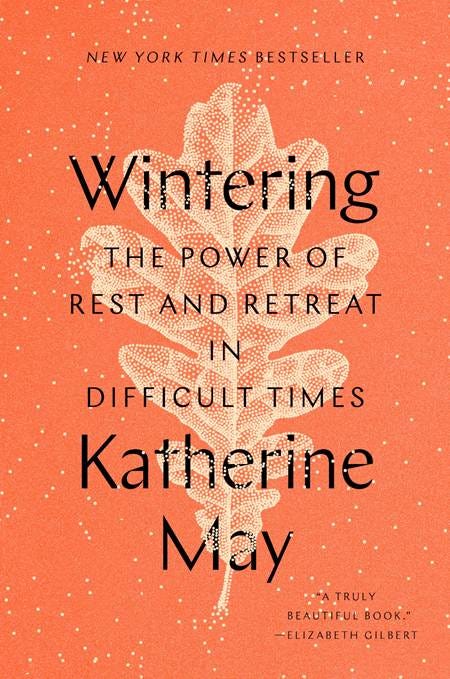Wintering: The Power of Rest and Retreat in Difficult Times
A guest appearance from bestselling author Katherine May

Today, a special treat for you.
This is the fifth anniversary of the great Katherine May’s bestselling book, WINTERING: The Power of Rest and Retreat in Difficult Times - and to celebrate, Katherine has graciously agreed to share an excerpt of her book with us today.
“Since Wintering was first published five years ago,” Katherine says, “I’ve received thousands of letters and messages - and have often been stopped in the street - because people yearn to share the story of their own low seasons. Shame is a constant theme in these confessions: the shame of not coping, of needing to stop, of believing that no-one else goes through this. I always suspected it was true, but it’s now abundantly clear to me that a life without a wintering period is rare. So many of us believe it’s the other way around. When we lack a language to describe our experiences, they become our secrets.”
Here, then, is a language for you to describe your experiences - so they need not become your secrets.
Here is Katherine, from WINTERING:
“Everybody winters at one time or another; some winter over and over again.
Wintering is a season in the cold. It is a fallow period in life when you’re cut off from the world, feeling rejected, sidelined, blocked from progress, or cast into the role of an outsider. Perhaps it results from an illness or a life event such as a bereavement or the birth of a child; perhaps it comes from a humiliation or failure. Perhaps you’re in a period of transition and have temporarily fallen between two worlds. Some winterings creep upon us more slowly, accompanying the protracted death of a relationship, the gradual ratcheting up of caring responsibilities as our parents age, the drip‑drip‑drip of lost confidence. Some are appallingly sudden, like discovering one day that your skills are considered obsolete, the company you worked for has gone bankrupt, or your partner is in love with someone new. However it arrives, wintering is usually involuntary, lonely, and deeply painful.
Yet it’s also inevitable. We like to imagine that it’s possible for life to be one eternal summer and that we have uniquely failed to achieve that for ourselves. We dream of an equatorial habitat, forever close to the sun, an endless, unvarying high season. But life’s not like that. Emotionally, we’re prone to stifling summers and low, dark winters, to sudden drops in temperature, to light and shade. Even if by some extraordinary stroke of self‑control and good luck we were able to keep control of our own health and happiness for an entire lifetime, we still couldn’t avoid the winter. Our parents would age and die; our friends would undertake minor acts of betrayal; the machinations of the world would eventually weigh against us. Somewhere along the line, we would screw up. Winter would quietly roll in.
I learned to winter young. As one of the many girls of my age whose autism went undiagnosed, I spent a childhood permanently out in the cold. At seventeen, I was hit with a bout of depression so hard that it immobilised me for months. I was convinced that I would not survive it. I was convinced that I didn’t want to. But somewhere there, in the depths, I found the seed of a will to live, and its tenacity surprised me. More than that, it made me strangely optimistic. Winter had blanked me, blasted me wide open. In all that whiteness, I saw the chance to make myself new again. Half‑apologetic, I started to build a different kind of a person: one who was rude sometimes and who didn’t always do the right thing, and whose big stupid heart made her endlessly seem to hurt, but also one who deserved to be here, because she now had something to give.
For years, I would tell anyone who would listen: “I had a breakdown when I was seventeen.” Most people were embarrassed to hear it, but some were grateful to find a shared thread in their story and mine. Either way, I felt with great certainty that we should talk about these things and that I, having learned some strategies, should share them. It didn’t save me from another dip and another dip, but each time the peril became less. I began to get a feel for my winterings: their length and breadth, their heft. I knew that they didn’t last forever. I knew that I had to find the most comfortable way to live through them until spring.
I am aware that I fly in the face of polite convention in doing this. The times when we fall out of sync with everyday life remain taboo. We’re not raised to recognise wintering or to acknowledge its inevitability. Instead, we tend to see it as a humiliation, something that should be hidden from view lest we shock the world too greatly. We put on a brave public face and grieve privately; we pretend not to see other people’s pain. We treat each wintering as an embarrassing anomaly that should be hidden or ignored. This means we’ve made a secret of an entirely ordinary process and have thereby given those who endure it a pariah status, forcing them to drop out of everyday life in order to conceal their failure. Yet we do this at a great cost. Wintering brings about some of the most profound and insightful moments of our human experience, and wisdom resides in those who have wintered.

In our relentlessly busy contemporary world, we are forever trying to defer the onset of winter. We don’t ever dare to feel its full bite, and we don’t dare to show the way that it ravages us. An occasional sharp wintering would do us good. We must stop believing that these times in our lives are somehow silly, a failure of nerve, a lack of willpower. We must stop trying to ignore them or dispose of them. They are real, and they are asking something of us. We must learn to invite the winter in. We may never choose to winter, but we can choose how.
~A surprising cluster of novels and fairy tales are set in the snow. Our knowledge of winter is a fragment of childhood, almost innate. All the careful preparations that animals make to endure the cold, foodless months; hibernation and migration, deciduous trees dropping leaves. This is no accident. The changes that take place in winter are a kind of alchemy, an enchantment performed by ordinary creatures to survive. Dormice laying on fat to hibernate, swallows navigating to South Africa, trees blazing out the final weeks of autumn. It is all very well to survive the abundant months of the spring and summer, but in winter, we witness the full glory of nature’s flourishing in lean times.”
*
OK, this is Susan writing again.
What did you think? I always love to know, and so would Katherine, and so would all our readers:
*Had you read Katherine’s work before?
*Are you in a season of wintering right now, or has a season of wintering affected you in significant ways? Do Katherine’s reflections shed any light for you?
*That last paragraph - about the fairy tales set in snow, the squirrels burying acorns, the trees dropping leaves, and most of all, the way this is all innate, known to us in earliest childhood…gave me goosebumps. You, too?
Please do share your thoughts! Today, I’m opening up the comment section to all our subscribers.



Susan, deepest thanks. The pictures you shared are gorgeous. I feel like I have been in a Wintering season for the last 4 1/2 years. Since my husband’s death. It has been the straw that broke the camel’s back if you will. All former close friendships/relationships have disappeared. It is a very different landscape I find myself navigating these days. I have tried to read Katherine’s book. I don’t have the best recall at this time. I appreciated what she shared here. I am going to reread her book. Also: I am grateful for everyone’s shared experiences here on Substack. It has been a struggle (since my husband’s death) to find the words to articulate my thoughts & feelings. Reading others experiences helps so much.
This is not really the same, but it is about sadness. We as a family were in Hawaii. My son in law was driving, and he got a call on his cell. He stopped to answer, and we could only hear his side of the conversation, but then he opened his door and stepped out of the car, and wept. The family dog had died. He also wept the first moment he saw my daughter in her wedding gown, as she turned a corner and they were face to face. She smiled, but his hands went to his eyes as the tears began to flow. This is part of the reason I love him so much… he’s very much a man, able to handle himself in all situations, but he has a tender heart.